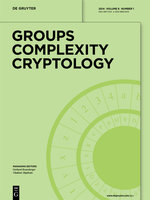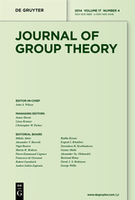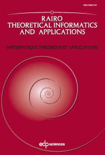
Groups Complexity Cryptology
Scope & Guideline
Exploring the Intersection of Mathematics and Security
Introduction
Aims and Scopes
- Group Theory and Its Applications:
The journal delves into various aspects of group theory, including finite groups, free groups, and their extensions. It examines the structural properties of groups and their implications in both theoretical and applied contexts. - Computational Complexity:
Research published in this journal often investigates the computational complexity of problems related to groups and algebras. This includes the development of average-case hardness results and efficient algorithms for group-related computations. - Cryptography and Security:
The journal features studies on cryptographic methods and protocols, particularly those that utilize algebraic structures such as groups. It explores topics like threshold encryption and secure communications based on algebraic properties. - Mathematical Logic and Structures:
There is an emphasis on the logical frameworks and structures that underpin group theory and algebra, including axiomatization and predicate structures, which are essential for understanding the foundational aspects of these fields.
Trending and Emerging
- Average-Case Complexity:
Recent papers emphasize average-case complexity in computational problems, suggesting a growing interest in understanding how algorithms perform under typical conditions rather than just worst-case scenarios. - Algebraic Structures in Cryptography:
There is an increasing trend towards utilizing advanced algebraic structures for cryptographic applications, including multi-recipient and threshold encryption, highlighting the intersection of algebra and security. - Efficient Algorithm Development:
The focus on developing efficient algorithms for various algebraic computations, such as those involving finite Z-algebras and Cayley groups, signifies a trend towards practical applications of theoretical findings. - Interdisciplinary Approaches:
Emerging themes reflect a blend of group theory with other mathematical areas, such as topology and logic, showcasing a broader interdisciplinary approach that can lead to innovative solutions to complex problems.
Declining or Waning
- Geometric Group Theory:
Research focusing on geometric aspects of group theory, such as growth rates and geometric structures, seems to be less frequent in recent publications, indicating a shift towards more algebraic and computational focuses. - Diophantine Equations in Groups:
The exploration of Diophantine problems within group contexts, while previously significant, has shown a reduction in attention, possibly due to the increasing complexity and specificity of related topics. - Historical and Foundational Studies:
There appears to be a waning interest in purely historical or foundational studies of group theory, with a shift towards more applied and computational research that has immediate relevance to current technological challenges.
Similar Journals

DESIGNS CODES AND CRYPTOGRAPHY
Unlocking Innovations in Coding and SecurityDesigns, Codes and Cryptography is a renowned peer-reviewed journal published by Springer, dedicated to the interdisciplinary fields of applied mathematics, computer science, and discrete mathematics. With an exceptional impact factor, this journal is recognized for its high-quality research contributions and currently holds a prestigious Q1 ranking in multiple categories, including Applied Mathematics and Theoretical Computer Science, as of 2023. Featuring an extensive range of articles from 1991 to 2024, the journal serves as a pivotal platform for professionals, researchers, and students alike, focusing on innovative developments in coding theory, cryptography, and their practical applications in computing and secure communication. The journal's scope encompasses theoretical foundations, as well as algorithmic and applied aspects, making it an essential resource for advancing knowledge in the rapidly evolving fields of computer science and mathematics.

COMBINATORICA
Elevating Mathematical Discourse Since 1981COMBINATORICA, published by Springer Heidelberg, is a leading international journal dedicated to advancing the fields of Discrete Mathematics and Combinatorics. With an illustrious history dating back to 1981 and a remarkable commitment to excellence, this journal has earned its place in the highest echelons of academic publishing, currently ranked in the Q1 category for both Computational Mathematics and Discrete Mathematics and Combinatorics. Located in Germany and recognized for its high-quality research contributions, COMBINATORICA fosters innovative discussions and disseminates significant findings that shape contemporary mathematical theory. Although it does not offer Open Access options, its rigorous peer-review process ensures that each publication meets the highest scholarly standards, making it an essential resource for researchers, professionals, and students engaged in mathematical sciences. With an impactful H-Index reflecting its citation influence, COMBINATORICA continues to be a pivotal platform for groundbreaking research in combinatorics and its applications.

JOURNAL OF GROUP THEORY
Illuminating Pathways in Mathematical Group TheoryJOURNAL OF GROUP THEORY, published by Walter de Gruyter GmbH, is a pivotal academic journal that delves into the intricacies of group theory, an essential area within the mathematical landscape, particularly in the fields of algebra and number theory. Established in 1998, this journal has made significant contributions to advancing research and theory until 2024, boasting a respectable Q2 ranking in its category as of 2023, underpinning its relevance among peers. Though it does not currently offer open access options, it remains accessible to a wide audience through institutional subscriptions, making its high-quality research available to universities and research institutions globally. With a current Scopus rank of 78 out of 119 in Mathematics and a 34th percentile standing, the JOURNAL OF GROUP THEORY is a vital resource for researchers, students, and professionals seeking to engage with cutting-edge developments in group theory and its applications. Located in Berlin, Germany, the journal serves as a core platform for disseminating rigorous research and fostering scholarly communication in this dynamic field.

Australasian Journal of Combinatorics
Unlocking the Secrets of Combinatorial ComplexityThe Australasian Journal of Combinatorics, published by the CENTRE DISCRETE MATHEMATICS & COMPUTING, serves as a vital platform for researchers and professionals engaged in the dynamic field of discrete mathematics and combinatorics. With an ISSN of 2202-3518 and an E-ISSN of the same, this journal has been committed to open access since 2014, ensuring that groundbreaking research is readily available to a global audience. Based in Australia, specifically at the Department of Mathematics, University of Queensland, this journal spans the years from 1996 to 2024, showcasing the evolution of combinatorial research over nearly three decades. Recognized in the 2023 category quartiles as Q3 in Discrete Mathematics and Combinatorics, it ranks 68th out of 92 in Scopus, reflecting its growing influence despite its current percentile of 26th. The Australasian Journal of Combinatorics is dedicated to fostering innovative research and theoretical development, making it a valuable resource for academics and students alike.

Cryptography
Leading the Charge in Information Security AdvancesCryptography, an esteemed journal published by MDPI, focuses on the rapidly evolving fields of cryptography and information security, providing a platform for researchers and practitioners to share their findings and advancements. Since its inception in 2017, it has embraced an Open Access model, allowing unrestricted access to high-quality research articles, thereby fostering collaboration and innovation among academics globally. Based in Switzerland, this journal aims to cover a broad spectrum, from theoretical foundations to practical applications, contributing significantly to fields such as Applied Mathematics and Computer Science. Its impressive rankings in reputable databases like Scopus reflect its relevance and quality, holding a Q2 category in multiple disciplines, including Computational Theory and Mathematics and Computer Networks and Communications. With the continuous rise in importance of cybersecurity and data protection, Cryptography serves as a vital resource for professionals, students, and researchers dedicated to advancing knowledge in these critical areas.

RICERCHE DI MATEMATICA
Exploring the Frontiers of Mathematical InnovationRICERCHE DI MATEMATICA, published by SPRINGER-VERLAG ITALIA SRL, is a prominent academic journal situated at the intersection of mathematics and its applications, with an ISSN of 0035-5038 and an E-ISSN of 1827-3491. Based in Italy, this journal serves as a crucial platform for disseminating innovative research findings and theoretical advancements in the diverse fields of applied mathematics and general mathematics, currently ranked in the Q3 quartile as per the 2023 category evaluations. The journal's standing is underlined by its impressive Scopus rankings, securing the 61st position out of 399 in General Mathematics and the 224th in Applied Mathematics, placing it well within the 84th and 64th percentiles respectively. Catering to a global audience of researchers, professionals, and students, RICERCHE DI MATEMATICA not only celebrates mathematical exploration but also enhances understanding through open discourse by fostering connections among scholars from various mathematical disciplines. With a converged publication cycle spanning from 2007 to 2024, the journal is committed to promoting high-quality research that shapes the future of mathematical sciences.

International Journal of Computer Mathematics- Computer Systems Theory
Transforming Ideas into Mathematical SolutionsInternational Journal of Computer Mathematics - Computer Systems Theory, published by Taylor & Francis Ltd, is a vital resource in the fields of computational mathematics and computer systems theory. With an ISSN of 2379-9927 and E-ISSN 2379-9935, this journal has established a prominent presence in academia since its inception in 2016. It is categorized in the Q3 quartile for both Computational Mathematics and Computational Theory in 2023, reflecting its impact and contribution to the scholarly discourse within these domains. The journal’s Scopus rankings further emphasize its academic relevance, placing it in the 38th and 33rd percentiles in their respective categories. International Journal of Computer Mathematics aims to disseminate innovative research findings, methodologies, and theoretical advancements, making it an essential publication for researchers, professionals, and students looking to deepen their understanding of computational methods and applications. Although it currently does not offer open access, the journal continues to provide insightful contributions to the scientific community, fostering the evolution of computational sciences.

Groups Geometry and Dynamics
Unlocking New Dimensions in Mathematical DiscourseGroups Geometry and Dynamics is a pioneering open-access journal published by the European Mathematical Society (EMS), dedicated to advancing the fields of discrete mathematics, combinatorics, geometry, and topology. With its ISSN 1661-7207 and E-ISSN 1661-7215, this journal serves the global mathematical community by providing a platform for high-quality research and insightful discussions. Established in 2009 and showcasing innovative findings through to its converged years of 2024, it has achieved notable rankings, securing a Q1 category in Discrete Mathematics and Combinatorics and a Q2 in Geometry and Topology, indicating its substantial impact within these domains. The journal's presence in Scopus ranks underscores its significance, positioned within the top echelons of its categories. As an open-access publication since 2021, it enhances accessibility and visibility for researchers, professionals, and students alike. Located in Berlin, Germany, and backed by a commitment to fostering collaborative research, Groups Geometry and Dynamics aims to be a leading voice in the mathematical discourse, challenging and inspiring inquisitive minds in the ever-evolving world of mathematics.

RAIRO-THEORETICAL INFORMATICS AND APPLICATIONS
Unraveling Complexities of Computational Theories.RAIRO - Theoretical Informatics and Applications is a renowned academic journal published by EDP Sciences S A that has been at the forefront of disseminating innovative research and applications in the fields of computer science and mathematics since its inception in 1995. With a focus on theoretical and applied aspects of informatics, the journal serves as a vital resource for researchers and professionals seeking to explore the intricacies of computational theories and their practical applications. Although currently lacking an Open Access model, it provides invaluable insights from distinguished researchers within its Q4 category rankings across its pertinent fields. As reflected in its Scopus rankings, including a position in the 24th percentile for General Mathematics and the 9th percentile for Computer Science Applications, RAIRO is pivotal in contributing to the ongoing discourse and advancements in theoretical informatics. Researchers, professionals, and students will find this journal critical in understanding emerging trends and challenges in the rapidly evolving domains of computer science and mathematics.

JOURNAL OF CRYPTOLOGY
Unlocking the Future of Security ResearchJOURNAL OF CRYPTOLOGY, published by SPRINGER, stands at the forefront of research in the domains of applied mathematics, computer science applications, and software security. With a history of significant contributions since its inception in 1988, this esteemed journal encompasses a broad range of topics in cryptology, including but not limited to encryption, security protocols, and information security systems. Holding a prestigious Q1 classification in multiple fields, it ranks #45 out of 635 in Applied Mathematics and has esteemed positions in Computer Science categories, reflecting its influence and recognition in the academic community, as evidenced by its high percentiles. As a vital resource for researchers, professionals, and students, the JOURNAL OF CRYPTOLOGY not only aims to disseminate innovative findings and methodologies but also fosters an engaging discourse within the cryptology and cybersecurity realms. Notably, it offers access through traditional subscription models, ensuring that readers benefit from a rigorous selection of high-impact research articles. Explore groundbreaking advancements and contribute to the ongoing dialogue in this pivotal field through your engagement with our journal.